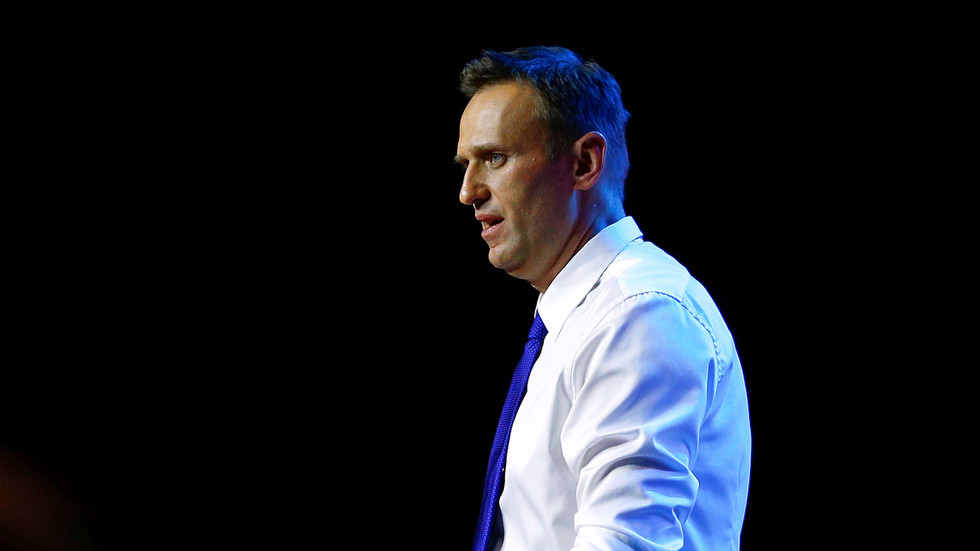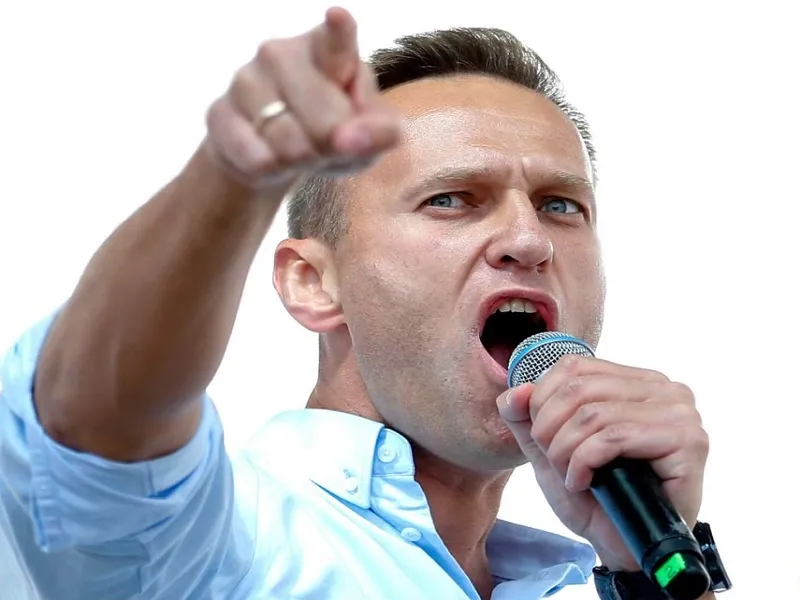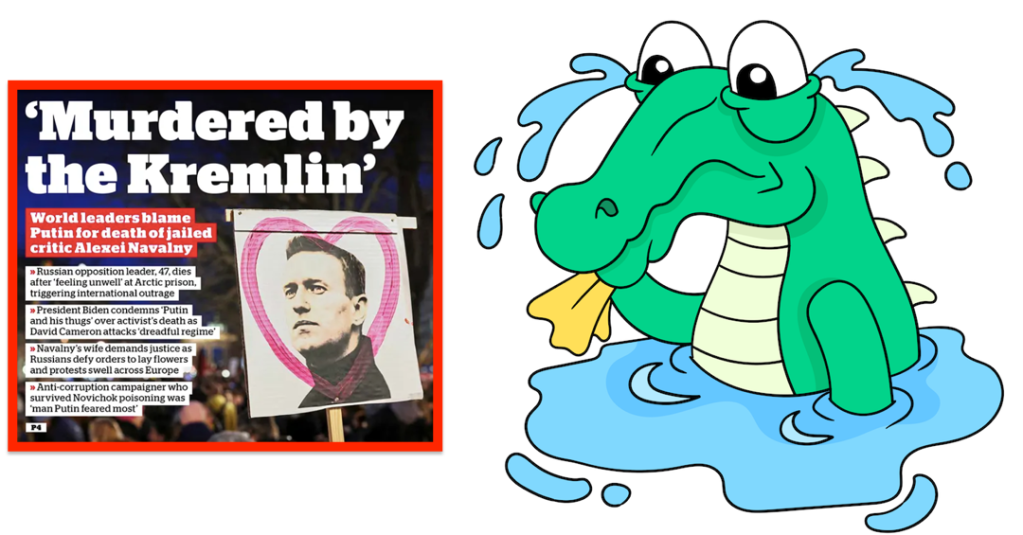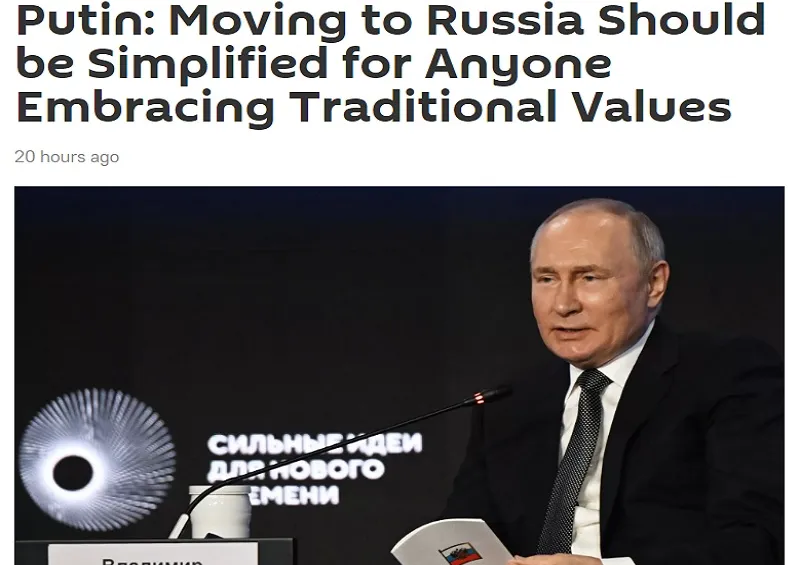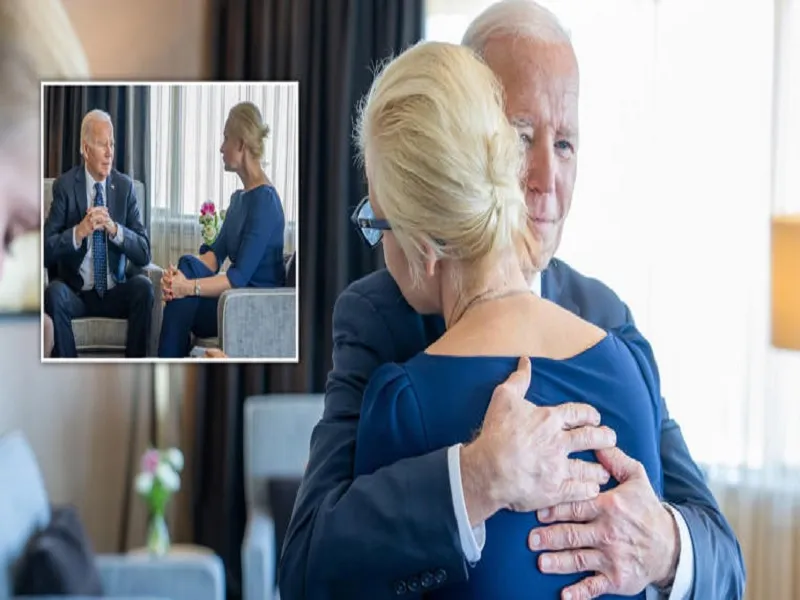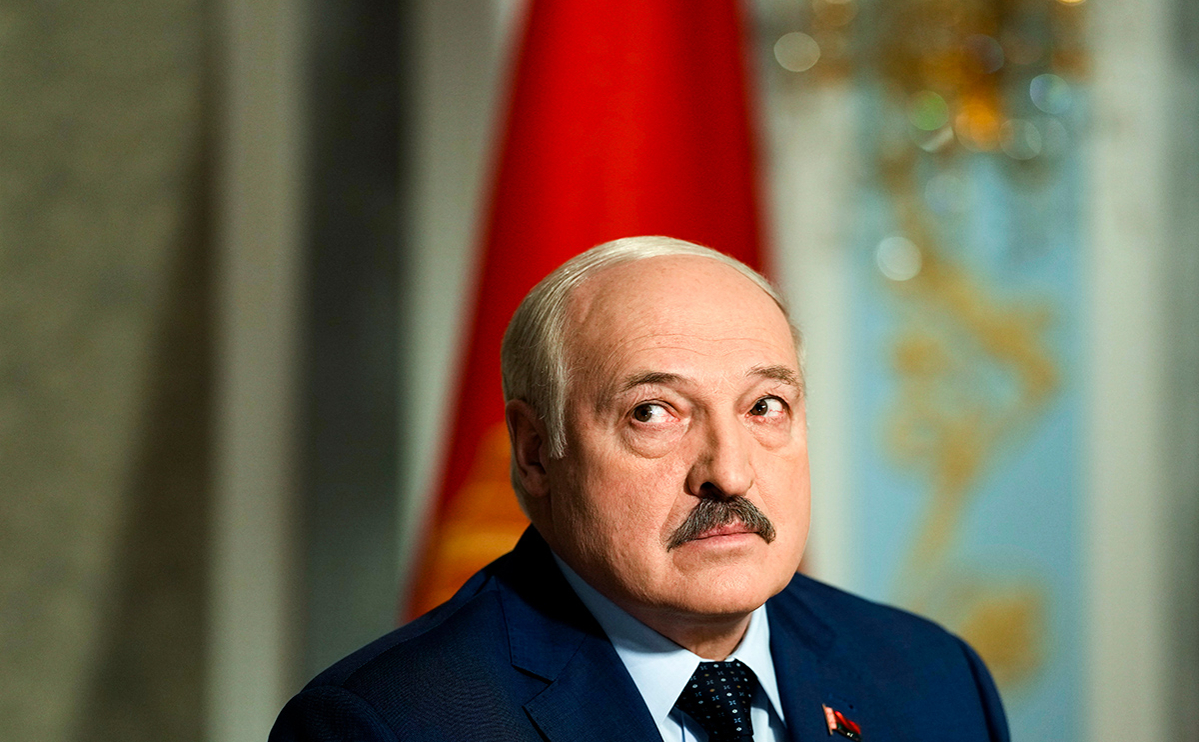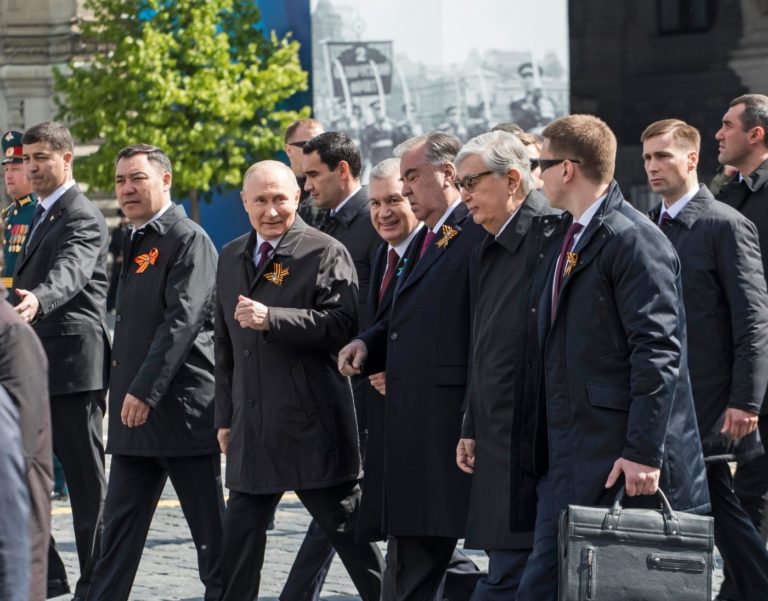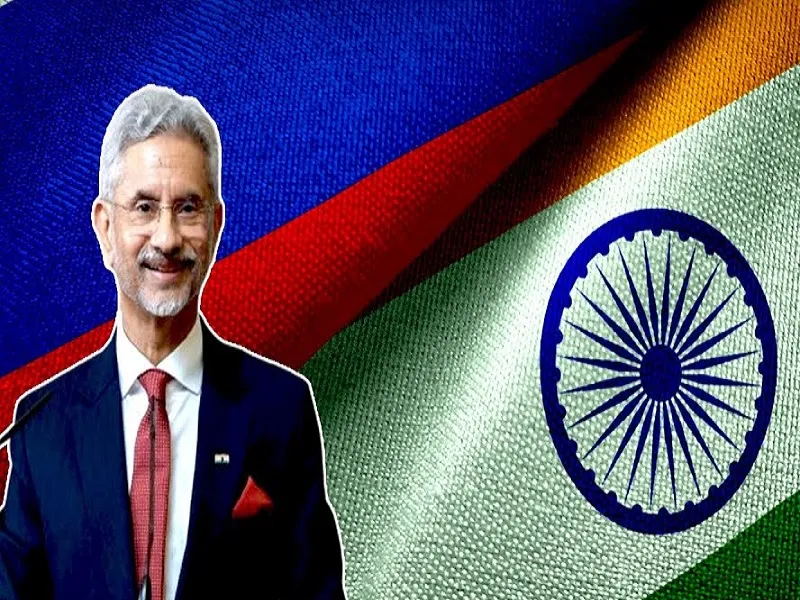February 12, 2024
Vladimir Putin’s challenge was to tell Americans through Tucker Carlson a complicated and unfamiliar narrative of how dearly Ukrainians and Russians are paying for Putin’s initial naïve trust in the West, writes Tony Kevin.
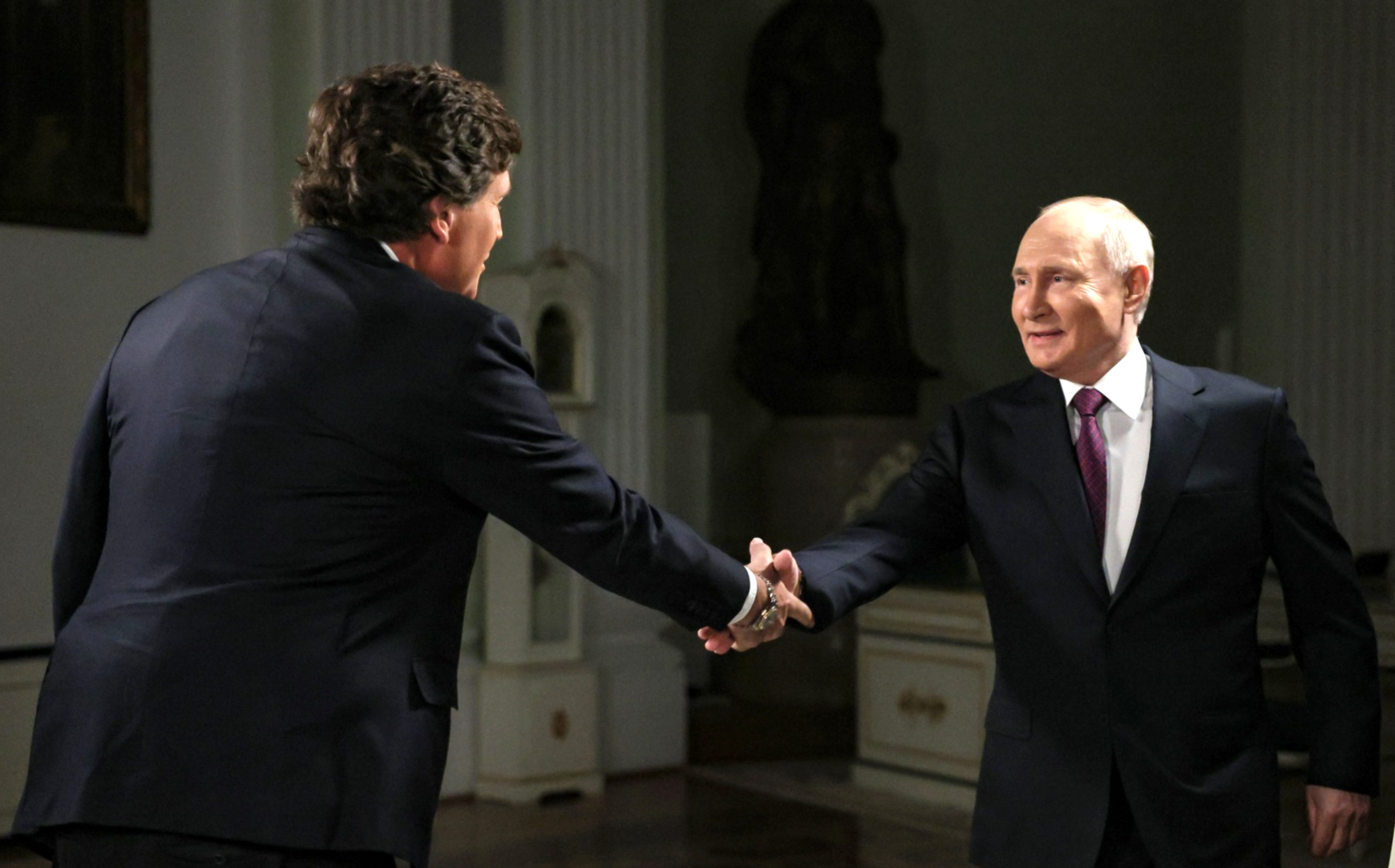
U.S. journalist Tucker Carlson with Russian President Vladimir Putin in Moscow on Feb. 6 for an interview that aired on Feb. 8. (Kremlin)
By Tony Kevin
Special to Consortium News
It is clear by now that both Vladimir Putin and Tucker Carlson took risks in embarking on their interview last week, gambles that appear to be paying off so far.
Putin was sick of rude and argumentative Western journalists. He had given no Western media interviews since Russia’s military operation in Ukraine began two years ago. He demanded, and received from Carlson, a serious interview in which he would be free to develop his facts and arguments.
He rather sharply reminded Carlson of the agreed ground rules at the outset of the interview, saying: “Are we having a talk show or a serious conversation?”
A chastened Carlson replied: ‘Thank you, it’s formidably serious.” And he spent the next two hours listening as Putin expounded at length on his main subjects: Russian-Ukrainian interconnected national histories since 862; and the causes, course and likely end of the present war in Ukraine. [Available in English voice and text on the Kremlin official website.]
This style of interview left Carlson vulnerable to ridicule from leading Western mainstream media, such as The Guardian, The Economist, The New York Times, Washington Post and the BBC.
They all essentially alleged that Carlson had betrayed his profession by fluffing the opportunity to put Putin on the spot with hard “gotcha” questions. Their consensus: the interview was boring, irrelevant, rambling, full of lies, simply not worth anybody’s time watching or reading.
It is clear already that much of the world’s journalistic universe disagrees. Putin’s extended history lesson appears in the world’s media and on social media platforms to have already made an impact on serious U.S., European and Global South audiences. Carlson’s reputation as a serious dissident Western journalist can only be enhanced by this conversation with the Russian president.
Putin’s Betrayed Trust in the West
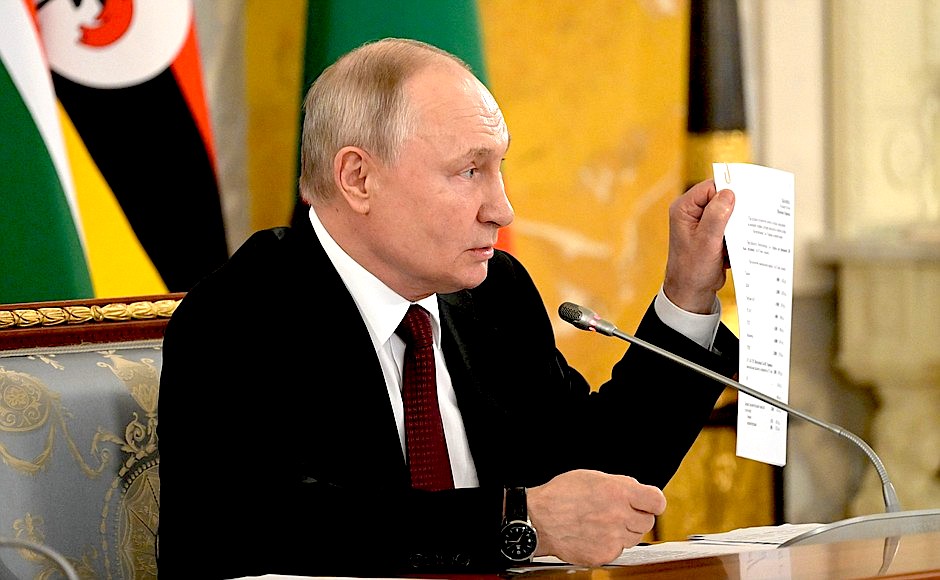
Putin in June 2023, showing African leaders what he said was a draft peace agreement with Ukraine, which was discussed in Turkey in 2022. (Kremlin.ru, CC BY 4.0, Wikimedia Commons)
The risk Putin ran was that under Carlson’s questioning he might inadvertently embarrass himself politically at home by exposing his earlier years of trust in the West. This trust was not finally extinguished in him until the crucial betrayal by Kiev under Western pressure of the agreement to end the Ukraine war, then still in its first weeks, which was reached in Russian-Ukrainian peace negotiations in Istanbul in March-April 2022.
Putin paid dearly for his decision then to withdraw Russian forces that had almost surrounded Kiev, as a gesture of good faith he said to the Kiev regime and its Minsk Accord guarantors, Germany and France. Within days the Bucha massacre took place, blamed on Russia but with evidence that it was carried out by the neo-Nazi Azov battalion.
Initially stunning the Kremlin with its cruelty and cynicism, Putin was then exposed to damaging criticism from harder-line Russian nationalists that he had been too gullible, putting Russian lives at risk.
Putin concluded that the West was never to be trusted again.
In the interview, Putin grieved the tragically huge number of Ukrainian and Russian Federation soldiers’ deaths and permanent disabilities in the long war, which should have ended in March 2022, but still bloodily continues.
Putin’s challenge was to tell American mainstream audiences through Carlson this complicated and unfamiliar narrative without reminding listeners how dearly Ukrainians and Russians — in his view, the same people — are paying for his initial naïve trust in the West. He focused listeners’ minds on Western treachery and duplicity rather than his own naïve acceptance of their trickery.
From this perspective, the interview was a battle of wits.
Putin exposed the history of Western false assurances during the five waves of NATO expansion after President Ronald Reagan’s and Bush Senior’s promises of “not an inch” to the East. He recounted the history of the United States’ sabotage of the Russian-German, Baltic gas pipeline last year, leading to the subsequent impoverishment of the German economy through loss of access to Russian cheap energy.
He denounced the Scholz government’s continuing betrayal of German national interests in favour of U.S. and NATO interests. He recalled how the war in Ukraine actually began with the February 2014 U.S.-instigated coup d’etat in Maidan Square, how Kiev’s military attacked Crimea and the Donbass and how Putin eventually responded by entering Russian troops into Ukraine in February 2022.
Rebutting Claims of Territorial Ambition
Putin rebutted claims of Russia’s territorial ambitions in and beyond Ukraine. He left open the possibility of future Romanian, Hungarian and Polish claims on parts of Western Ukraine annexed by Stalin in 1945. He made it clear the Odessa region was at risk of being incorporated into Russia, along with the four already incorporated Novorussian regions. But he promised flexibility in peace negotiations, saying:
“Let them [Ukraine regime, U.S. and NATO ] think how to do it with dignity. There are options if there is a will.”
It may be significant that Putin complimented Volodymyr Zelensky’s father’s good war record in the Great Patriotic War. This may suggest Putin does not rule out Zelensky possibly having a role as Ukrainian leader in peace negotiations.
Putin effortlessly rebutted Carlson’s efforts to tempt him to express an opinion in favour of former President Donald Trump in the upcoming U.S. presidential election, a trap he was too smart to fall into. Putin replied that it does not matter who is U.S. president, the hegemonic policies and values of the Washington permanent elite remain the same.
Carlson’s Curveball
Towards the end of the interview, Carlson threw Putin an interesting curveball, asking him to release Evan Gershkovich, the sentenced and imprisoned U.S. journalist on espionage charges, and allow Carlson to take him back to the United States.
Putin was likely prepared for the Gershkovich issue to come up. Carlson had to raise it, or else he would have been crucified by the Western media.
Yet I think Putin was taken aback by the drama of Carlson’s proposal. He answered carefully and in detail. I believe this exchange will prove useful in negotiating Gershkovich’s eventual release and hopefully also that of Paul Whelan, a U.S. marine imprisoned in Russia for espionage, as part of a delicate prisoner exchange. It would involve the case of a Russian agent’s execution in Germany of a notorious Chechen terrorist who had murdered Russian prisoners of war during the Chechen wars.
Western media had no plausibility in accusing Carlson (as they nevertheless tried to do) of not raising the Gershkovich case strongly enough.
On other matters, Putin bluntly accused the West of C.I.A. subversion against Russia in the Chechen wars and other jihadist violent insurgencies in the North Caucasus — more categorically and bitterly than ever before publicly.
They did not discuss the current appalling situation in Gaza where Israel continues to violate its human rights obligations as a U.N. member. I assume this was by prior agreement: probably Putin did not want to be personally quizzed on Russia’s position on Israel’s ongoing massive war crimes. Foreign Minister Sergei Lavrov and Russia’s U.N. ambassador have already made such criticisms strongly.
One could argue that the outcome was a win for both men. Putin offered the West through the vehicle of the Carlson interview a clear window into his thinking on how to end the war in Ukraine: denazification as part of the peace negotiation and subsequent legislation, and an end to Western arms supplies to Kiev.
Putin ended the interview on his own terms. He was mocked by Sarah Gainsford of the BBC for doing so, proving yet again that years spent working in the in-bred Western foreign correspondent community in Moscow do not open closed Russophobic minds.
https://consortiumnews.com/2024/02/12/w ... -achieved/
*****
Sputnik International article on Trump’s latest remarks regarding NATO
Sputnik International article on Trump’s latest remarks regarding NATO
I offer the following brief article from Sputnik International as a foretaste of what I intend to post later today or tomorrow when I receive the link to the extensive WION interview I gave this morning covering the same subject.
The whole issue of Trump’s refusal to come to the aid of NATO members who do not contribute fully to the Alliance is a great deal more substantive and thought through than what you hear and read in mainstream media. Like him or not, Trump is no fool and dismantlement of NATO entails a wholly different concept of U.S. defense than what our foreign policy establishment promotes, for its own benefit and to the detriment of the nation.
See https://sputnikglobe.com/20240212/europ ... 44370.html
Regrettably this link may not be accessible in some jurisdictions of the Collective West due to state censorship.
https://gilbertdoctorow.com/2024/02/13/ ... ding-nato/
******
FEBRUARY 13, 2024 BY M. K. BHADRAKUMAR
Putin signals interest in Ukraine talks
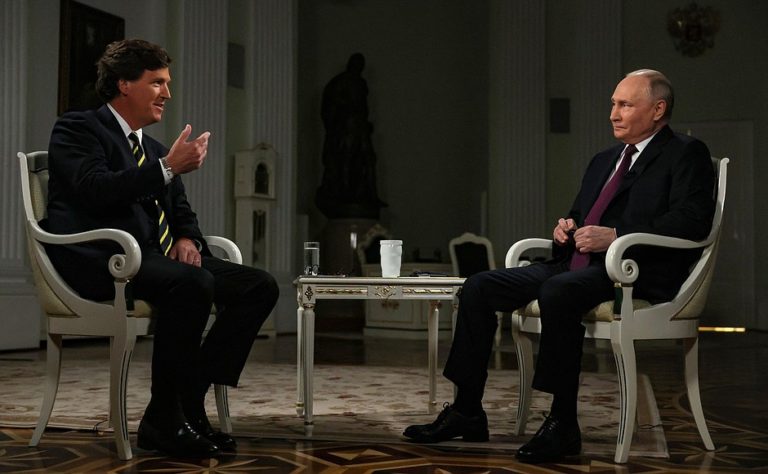
Russian President Vladimir Putin (R) with American journalist Tucker Carlson (L), The Kremlin, Moscow, February 9, 2024
The great beauty of Russian President Vladimir Putin’s interview with the famous American journalist Tucker Carlson is that there is something in it for almost everyone — be it historians who memorialise the past; diplomats who isolate history and take it out of context; spymasters who were cold warriors with adrenaline flowing still; politologists who contrived to create false narratives; and even an American president or two and one colourful British Prime Minister most certainly, who may have blood on their hands.
Carlson stated modestly that he wanted to sit down with Putin because “most Americans are not informed” on how the war in Ukraine is “reshaping the world.”
In the event, as their 2-hour long conversation progressed, a vast panorama unfolded:
*from the origin of Rus to the “artificial state” that is Ukraine;
*from Dostoevsky to the Russian soul;
*from the US’ rebuff to post-Soviet Russia’s hankering to be part of the western alliance to CIA’s support for separatism and terrorism in North Caucasus;
*from NATO’s expansion to the appearance of its bases in Ukraine;
*from the US’ proactive deployment of ABM system in Europe to Russia countering with hypersonic strike systems;
*from weaponisation of dollar to the blowback of de-dollarisation; and,
*the imperative need for the US to adjust to the geopolitical reality that “the world is changing.”
The interview has broken the internet, garnering dozens of millions of views on X. Its reverberations may likely continue during the campaign for the November elections. Independent Presidential candidate Robert Kennedy Jr wrote: “Tucker Carlson has been smeared for days. The legacy media and Democrat establishment are upset at him for simply doing his job. Americans can handle thought-provoking conversations. We can handle dangerous thoughts or contrary ideas that don’t fit the MSM narrative. Let us decide for ourselves.”
Without doubt, the war in Ukraine was the leitmotif of the interview. When asked about the prospect for peace, Putin suggested, “If you really want to stop fighting, you need to stop supplying weapons.” Putin further responded, “It will be over within a few weeks. That’s it.”
The tantalisingly easy solution is anchored on Putin’s belief, which he held consistently since the conflict began in February 2022, that this is at the core a civil war and a fratricidal strife that divided families, relatives and friends, which might not have happened without the maleficent, intrusive behaviour by Western powers.
The interplay of three related factors may account for Putin’s guarded sanguineness. First and foremost, the interview comes as momentum on the battlefield has swung in Russia’s favour. Also, at a deeper level, the Congressional resistance to aid to Ukraine underscores the transformation of party dynamics and the electorate in the US.
The Republican Party, which once distinguished itself by its tough opposition to Russia, is increasingly leaning toward isolationism and, in some circles, there is even sympathy for Moscow.
Of course, if American politics is feverish, it is not due to Putin but due to the growth of populism, the polarisation of society, which are internal phenomena with historical roots. After decades of bipartisan Cold War consensus about America’s role in the world, for many, globalisation, flow of illegal migrants, foreign wars, etc. have discredited the old way of thinking.
A second factor could be the nascent sense in some quarters in Moscow that although President Zelensky “deceived his voters” by turning his back on his mandate to end the conflict in Donbass, and instead decided in self-interest that it was “beneficial and safe… not to clash with neo-Nazis and nationalists, because they are aggressive and very active, you can expect anything from them, and secondly, the US-led West supports them and will always support those who antagonise with Russia” — nonetheless, he still can negotiate with Moscow.
Putin recalled the stunning disclosure in an interview on Ukrainian television by Davyd Arakhamia who headed the delegation to negotiate with the Russian officials in Istanbul in March 2022 and had, in fact, initialled the final document, that “after we returned from Istanbul, Boris Johnson visited Kyiv and said that we should not sign anything with the Russians and ‘let’s just fight’.”
To quote Arakhamia, who currently is the leader of the ruling party’s faction in the Ukrainian parliament and a top advisor to Zelensky, “The war could have ended in the spring of 2022 if Ukraine had agreed to neutrality. Russia’s goal was to put pressure on us so that we would be neutral. This was the main thing for them: They were ready to end the war if we accepted neutrality, like Finland once did. And for us to make a commitment that we will not join NATO. This is the main thing.”
Arguably, this is where the power struggle in Kiev and the ouster of Gen. Valery Zaluzhni, formerly Commander-in-Chief of the Armed Forces comes into play as the third factor. Significantly, on Monday, according to a Tass report, the head of Russia’s foreign intelligence service Sergey Naryshkin issued a statement in Moscow that the US and its G7 allies are nervous about defections from Ukrainian regime and are floating an idea to appoint a special representative in Kiev to ensure that Zelensky acts on the dotted line. Naryshkin hinted that there is basis to such fears in the G-7 capitals.
Indeed, at the fag end of the interview with Carlson, Putin also left a parting message that “There are options (for peace talks) if there is a will.” He added:
“Up until now, there has been the uproar and screaming about inflicting a strategic defeat on Russia on the battlefield. Now they (NATO) are apparently coming to realise that it is difficult to achieve, if possible at all. In my opinion, it is impossible by definition, it is never going to happen. It seems to me that now those who are in power in the West have come to realise this as well.
“If so, if the realisation has set in, they have to think what to do next. We are ready for this dialogue… to put it more accurately, they are willing but do not know how to do it. I know they want. It is not just I see it but I know they do want it but they are struggling to understand how to do it… Well, now let them think how to reverse the situation. We are not against it.”
The big question is whether the Biden Administration will bite the bullet. The German Chancellor Olaf Scholz visited the White House on February 9. In his media remarks before the meeting with President Biden, Scholz doubted Putin’s intentions, saying “He wants to get the part of the territory of its neighbours. Just imperialist — imperialism. And I think it is necessary that we do all our best to support Ukraine and to give them the chance to defend their country.”
On his part, though, Biden remained circumspect. Later, a detailed White House readout focusing on West Asian developments, merely stated: “President Biden and Chancellor Scholz reaffirmed their resolute support for Ukraine in its struggle against Russia’s war of aggression. The President commended Germany’s exemplary contributions to Ukraine’s self-defence, and Chancellor Scholz emphasised the significance of sustained U.S. support.”
It seems the high probability is that the Biden administration intends to keep the conflict alive at least until November while its main focus will be on West Asian developments that have a direct bearing on the president’s candidacy in the November elections .
https://www.indianpunchline.com/putin-s ... ine-talks/
******
REUTERS: WEST STANDS TO LOSE AT LEAST $288 BLN IN ASSETS IF RUSSIAN ASSETS SEIZED -RIA
FEBRUARY 12, 2024

Photo by Karolina Grabowska on Pexels.com
Reuters, 1/21/24
Russia’s state RIA news agency said on Sunday it had calculated that the West stood to lose assets and investments worth at least $288 billion if it confiscated frozen Russian assets to help rebuild Ukraine and Moscow then retaliated.
After President Vladimir Putin sent forces into Ukraine in February 2022, the U.S. and its allies prohibited transactions with Russia’s central bank and finance ministry, blocking around $300 billion of sovereign Russian assets in the West.
U.S. and British officials have worked in recent months to jumpstart efforts to confiscate Russian assets immobilized in Belgium and other European cities in order to help reconstruction in Ukraine, parts of which lie in ruins.
They hope Group of Seven leaders will agree to issue a stronger statement of intent when they meet in late February, around the second anniversary of Moscow’s invasion of Ukraine, three sources told Reuters on Dec. 28.
Russia has accused Washington of trying to strong-arm countries in Europe, where most of the Russian assets are, into signing up to similar measures, and the Kremlin has said that Moscow has a list of U.S., European and other assets that would be confiscated if Western countries press ahead.
RIA cited data which it said showed that direct investment by the European Union, the G7 nations, Australia and Switzerland in the Russian economy at the end of 2022 totalled $288 billion.
It said EU nations held $223.3 billion of the assets, of which $98.3 billion was formally held by Cyprus, $50.1 billion by the Netherlands and $17.3 billion by Germany.
It said the top five European investors in the Russian economy also included France with assets and investments worth $16.6 billion and Italy with $12.9 billion.
Among the G7 countries, it named Britain as one of the largest investors, citing data at the end of 2021 which showed British assets in Russia were worth about $18.9 billion.
It said the United States had $9.6 billion worth of Russian assets at the end of 2022, Japan $4.6 billion and Canada $2.9 billion.
Switzerland and Norway, which RIA said usually signed up to anti-Russian measures, had $28.5 billion and $139 million respectively at the end of 2022, it said, while data showed Australia had $683 million invested at the end of last year.
Reuters could not verify the data cited by RIA.
https://natyliesbaldwin.com/2024/02/reu ... eized-ria/
******
About respect for the state
No. 2/90.II.2024
At one time, the theory of state and law was read to us by an energetic Azerbaijani from the Law Faculty of Moscow State University, who, despite his 35 years, did not hide the fact that he is a communist and adheres to the Marxist theory of state and law. It was in 1997-98, and liberal students somehow decided to tease him and asked how he felt about the Yeltsin regime. Everyone expected to hear the standard Communist Party rhetoric about traitors, but the answer was unexpected for the students. He, with a slight Caucasian accent, simply said: “I don’t respect him.” After which he explained that the state is based not only on violence. Violence is the simplest and most primitive tool, and like all simple and primitive tools, it is useful only for the simplest tasks. But the second important state instrument is the informal authority of the state, that is, recognition by society as a whole, under the ideological leadership of the ruling class, of the wisdom, necessity and usefulness of state decisions and the need to implement them.
It was not for nothing that Plato placed philosophers in his ideal state at the top of the state pyramid. Observing a slave-owning society, in which private property promoted a variety of people to leadership positions on the basis of property - from the capable and talented to complete fools, Plato came to the quite logical conclusion that under conditions of private property there is absolutely no positive selection for public positions, what type of state no matter what: aristocracy, democracy, theocracy, tyranny, etc. The crude and brainless violence, natural for such a selection of personnel, quite often showed in the Greek city policies its powerlessness and inability to solve public problems, and this prompted Plato (and before him and his teacher Socrates) to the idea that only selection based on competence is capable of maintaining the existence of the state as such. In the dialogue “State”, the idea is clearly visible that the state system itself does not collapse solely because it still randomly includes people who think not only about their wallets, one way or another understand the public good and in this they gain support from others citizens of the policy.
If we talk about the Russian state, then negative selection in it has already become the talk of the town.
In the 90s, the newborn Russian bourgeoisie wanted to have a cheap state. That’s why she generously fed the top with bribes in various forms, and kept the lower bureaucrats in a black body - she didn’t pay them wages for six months, salaries in government agencies lagged behind inflation with cosmic acceleration, and whoever was at least a little smarter and could somehow find a job outside government structures , ran from them without looking back.
In the 2000s, during the Putin era, the lower bureaucrats were fed, and the top began to be selected from among the “Rabbit’s relatives and friends,” that is, on the principle of loyalty and devotion to the ruling elite, but a new misfortune came - the strengthening of the vertical of power sharply strengthened what is called "bureaucratic idiocy." That is, those very “faithful people” in the bosses, being recruited not on the principle of competence mainly, but only in order to have “their own” everywhere, gave rise to the most idiotic ideas regarding the organization of processes. Anyone who has worked in government agencies has a fairly clear idea of the huge pile of irrationally, idiotically organized processes, the most stupid decisions, the most confusing regulations and an endless circle of approvals. That is, the strengthening of the state vertical led to the fact that the stupidity of the authorities, previously, under Yeltsin, which was braked at the bottom and leveled out by non-execution, permeated the entire apparatus. In such conditions, the requirements for management personnel should have increased, but in fact they have not increased. Because the class of private owners themselves is basically stupid regarding everything that does not relate to making a profit, and cannot rank their minions according to their competence. This is how furniture dealers appear in ministers of defense, and writers of cheap kitsch in ministers of culture.
If we listen to what the heads of industries, ministries, regional and republican departments say, when they speak not in stereotypical bureaucracy, but purely from themselves, that is, they say what they think, then we will see that there are a tiny number of real specialists there, and the majority of deputies and ministers are just standard ignorant donkeys who can be recruited anywhere, and in order to express such nonsense, you don’t need to graduate from the academies of public administration or the customs service, any khanurik at the market will say essentially the same thing. And it’s not a fact that not in the same words (considering that even the Minister of Foreign Affairs periodically uses obscenities).
For lower-level bureaucrats, the presence of incompetent bosses results in constant stress at work, which, in conditions where the salaries of lower-level officials still, as a rule, do not catch up with salaries in commercial structures, results in an outflow of any thinking personnel, and those who remain simply mechanically perform descended from above, without thinking about the content.
There are, of course, regions with high unemployment and destroyed industry, where salaries in government agencies are like manna from heaven. But in such regions, the selection of personnel sharply begins to follow the principles of nepotism, trade in positions flourishes, the remaining ones frantically hold on to their positions, and therefore are ready to comply with any tyranny of the boss, even if it is prohibitive idiocy.
The result of such a personnel policy of the state is that the low-level official, that is, the representative of the apparatus with whom the ordinary citizen mainly communicates, displays qualities that do not in the least contribute to the respect and trust of citizens in the state apparatus. On the one hand, he furiously and with zeal carries out any nonsense that comes from above, on the other hand, he does not do anything that requires his personal initiative, personal strong-willed decision, even if he subjectively considers this decision to be correct and necessary for the well-being of citizens and states. But for the most part, he doesn’t even think about anything, he has instructions, he mechanically works according to them.
Millions of parents observe administrative idiocy in the education system almost every day. For example, in Moscow they banned New Year's parties with discos in schools, allowing only formal and demonstrative events in the form of rehearsed matinees, they banned school excursions (or rather, they made them extremely difficult - in order to go from a residential area of Moscow in class to the Tretyakov Gallery, you need to book many weeks in advance certified bus, provide and agree on lists, collect all the extra money for this, instead of getting on the subway and getting there. And class excursions to the suburbs and other cities were generally banned). Schoolchildren, parents and teachers are pestered with various idiotic tests and a barrage of unnecessary tests, as a result of which teachers have no time to even study the material for their classes, they have to report. Yes, every parent of a schoolchild throws out a whole heap of such nonsense, obvious even to a person without a specialized education. As a result, only those teachers who have somehow adapted to this administrative stupidity remain in schools, or those who cannot find a job anywhere else, that is, they are not such good teachers as to withstand the competition in the labor market in commercial education. Similar stupidity is happening in the police, and in the registration authorities, and in healthcare.
All complacent (and even correct) decisions at the top, passing through layers of incompetent but stupidly executive bureaucratic masses, turn directly into their opposites and do not achieve the goal that the leaders of state administration initially pursued. At one time, there was a story by Averchenko “Persons Close to the Population” on this topic. 100 years have passed, and “Russia, which we lost,” is again in all its idiotic non-commissioned Prishibeev glory. For example, a completely sensible idea that in conditions of war with Ukraine and confrontation with the West, it would be necessary to close pro-Ukrainian and pro-Western liberal resources (which, it must be said, communists only welcome, since these same resources most aggressively preach the benefits of a market economy) is carried out like this: that it would be better not to do it. Instead of real and effective measures, the idiotic catching of some dude with a sock on his penis begins, the closure of VK accounts of people who liked something anti-Putin, checking the social networks of civil servants for the length of teachers’ petticoats and other very strange events. Why? Because such events correspond to the level of the performer and the official, even if he wants, cannot rise above catching a fool with a sock, because intellectually he is the same fool, only without a sock.
Thus, an ordinary citizen, communicating with the lower elements of the state apparatus, is clearly convinced of its exceptional stupidity, cannot be filled with a feeling of awe towards it, and is certainly not afraid of losing it. Who, the question is, will cry if they suddenly disperse the tax office, which sends wild taxes for a summer cottage, after which a citizen collects papers for six months, proving that he is not a camel? Who, the question is, is afraid of losing a crowd of bailiffs who easily seize credit accounts, as a result of which citizens find themselves in debt to the bank for no reason? Or maybe someone is afraid of parting with the crowd of officials from the Ministry of Education, who come up with more and more new rules for admission to universities every year and constantly change the requirements for the Unified State Exam? Courts that almost never understand the merits of the case, but exclusively formally consider all cases?
Yes, almost every interaction with the grassroots apparatus of the state makes a mentally normal citizen want to, if not shoot, then certainly disperse the entire pack of bureaucrats.
In a word, the state, having a stupid and intellectually incapable apparatus, is not needed by any of the citizens, has no authority, and only the massive disorganization of the proletariat allows it to exist. This is the very case when “order beats class.” The proletariat, having in its composition a sufficient mass of quite capable personnel (from the intelligentsia, advanced workers, office workers), lacking an organization, suffering from state stupidity (and from state stupidity even from the point of view of the bourgeois state), cannot cope with the state machine, and That’s why the “monster is loud, mischievous, yawning and barking” and is feeling great and is not going to get smarter. Even with the prospect that fools never ultimately win.
By the way, the Soviet state was also not free from this vice at a certain stage. The core of the Bolshevik party, those same pre-revolutionary 15 thousand people, were literally the cream of the then society in the best sense, they were the most educated intellectuals with many scientific works, knew several languages and had large technical and social projects behind them: Lenin, Stalin, Krasin, Krzhizhanovsky , Tsuryupa, Semashko, Lunacharsky; These were the best workers, who had a good knowledge of both production and the sociology of labor, who knew how to link social science and philosophical knowledge with practical labor experience, who knew the masses, who knew how to find an approach to them, including an informal, non-official approach. But as soon as the Bolsheviks became the ruling party, they had to recruit many people with much worse qualities into both the Soviet and party apparatus - the apparatus is large, but there are few Bolsheviks. In addition, crooks, careerists, fools rushed into the ruling party, who rushed “along with everyone else,” like that grandfather Shchukar, who believed that the party “will be given a briefcase.” And what they left came back almost immediately.
It took many years of educational work and many years of selection and personnel selection in order to exclude the most obvious fools from the apparatus, in order to achieve creative, that is, understanding the essence of events, execution of orders on the ground (and this was not achieved everywhere). Even during the Great Patriotic War, the result has not yet been fully achieved - the documents convey to us the sheer nonsense of the personnel on the ground: they either plowed a field in the snow, breaking the tractors, or took away from the collective farm grain intended for distribution for workdays, and even at the front, for government supplies. for stupidity and sloppiness they were repeatedly removed and replaced with new ones, or even shot. But the difference from the capitalist state here was that the party perfectly understood this problem, understood how to deal with it, that is, to establish a system for training and monitoring the competence of personnel, and actively fought against it in practice - promptly removed fools from administrative posts, trained young staff, constantly maintained feedback with the population and responded sensitively to disturbances. Even culturally, practically the main object of ridicule in Soviet comedies is the foolish official who performs without thinking.
Does the Russian bourgeois state understand this problem and is it fighting it? “United Russia” in no way aspires to be a full-fledged party - it is simply a loose, formalized association fed by the state apparatus, consisting mostly of representatives of the same state apparatus. The capitalists not only do not allow him to completely change personnel, but they themselves manage it as they want, and they manage it through the same officials. That is, the United Russia body is in no way qualified to act as a control apparatus. Even according to its primitive ideology, United Russia (which is more a formality than ideas realized by its members) is not capable of solving any problems of public administration. The apparatus itself is also incapable of clearing itself of idiots: judging by the fact that Putin has been repeating virtually the same thing on various occasions since May 2005, that his orders are not being carried out locally, beneficent decisions by “persons close to the population” are carried out idiotically in in those cases when the lower ranks of the bureaucracy are left to decide for themselves what and how to execute.
The top leaders of the Russian state and the bigwigs of Russian business not only do not intend to change the personnel policy, but also do not see anything flawed in the current personnel policy that, in principle, should be changed. There is virtually no working feedback system for all “public services” and “electronic governments”. Anyone who writes a complaint against an official about irregularities in matters subordinate to the state will receive only a formal response, generated... by a robot. And, as a rule, there is no reaction other than a formal reply about the “measures taken.” Due to the fact that it is pointless to correspond with a stupid bot that can neither calm down those who violate public order, nor patch roads, nor repair public utilities, citizens simply stop writing there, the system, without even receiving such feedback, becomes a puppet and loses the last vestiges of authority , which are currently supported by the loud statements of Putin himself and spontaneous patriotic sentiments in the lower classes, which still interpret patriotism in a spontaneous communist vein.
However, this situation is just before serious defeats. And defeats are almost inevitable - you can’t always count on, having a stupid state apparatus, that the enemy’s apparatus will always be even dumber! Sooner or later, someone will outplay the fools, and then it will become clear that all the bureaucratic nonsense, hidden for the time being, will come out clearly, the handlessness, incompetence and stupidity of the ruling class in general and the state apparatus in particular will become clear. And here they will lose not only to the external enemy, but also to the internal one, that is, to us. But we, communists, still need to be ready for this:
*to form the required number of personnel, sufficient not only to take power, but also to organize their own state apparatus,
*unite these cadres into a party,
*establish selection for the party based on the principle of competence,
*constantly work to improve the competence of all our personnel,
*to prepare our personnel not only for propaganda work, but also for management, which implies, in addition to general theoretical matters, their development in terms of substantive solutions to management issues in a theoretical form.
I. Bortnik
02/12/2024
https://prorivists.org/90_respect/
Google Translator





